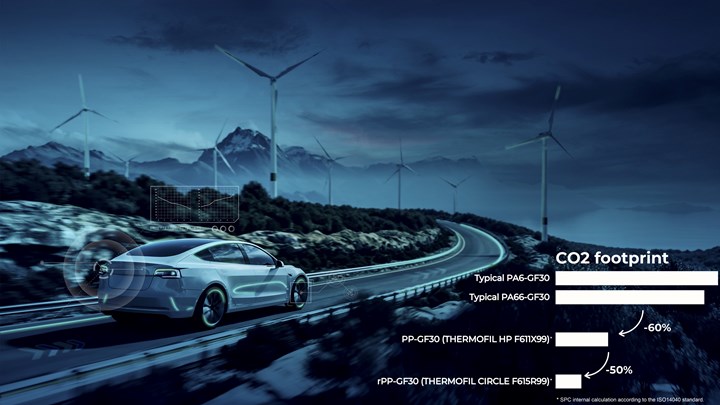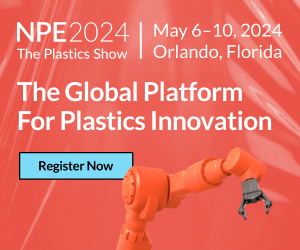Sumika Partners with Hexagon to Enable 60% Plastic Carbon Reduction for New Vehicles
Digitized mechanical and environmental performance of recycled short glass-fiber reinforced PP compounds supports the transition to more sustainable vehicles.
The Manufacturing Intelligence division of Hexagon, a global leader in digital reality solutions, combining sensor, software and autonomous technologies, and Sumika Polymer Compounds Europe (SPC Europe), a leading manufacturer of thermoplastic compounds, have partnered to digitize the performance of new sustainable automotive-grade PP compounds, enabling engineers to design components that are more recyclable and offer a lower carbon footprint for future vehicles.

Sumika’s short glass-fiber PP (GF-PP) Thermofil HP and recycled PP (GF-rPP) Thermofil Circle materials benefit from sustainable manufacturing and recycling processes and offer carmakers performance equivalent to incumbent engineering plastics, but with an up to 60% lower carbon footprint. The partners note that a growing proportion of today’s PP components are recovered and recycled compared to nylons, of which up to 70% are utilized in waste-to-energy initiatives or finish up in landfill, but there remains substantial room for improvement.
The new Sumika recycled PP compounds are designed for the circular economy, contributing to plastic waste reduction at vehicle end-of-life.Plastics can contribute up to 20% of the total weight of a car, and their application is escalating with the continuing replacement of metals. The automotive industry’s shift to eMobility has increased the need for lightweighting components to maximize the energy efficiency of vehicles and mitigate the considerable weight of battery packs, but their environmental performance throughout the lifecycle must also be considered by product development teams.
Said Guillaume Boisot, head of Hexagon’s Materials Center of Excellence, “Limited material behavior data is a barrier to sustainable eMobility innovations because automotive engineering teams have not been able to put new materials through the rigorous virtual durability and safety tests required for automotive endorsement. Our unique multiscale material modelling technology accelerates the adoption of SPC Europe’s ground-breaking recycled materials by making it possible for product development teams to accurately simulate a component and subject it to established automotive engineering test and validation.”
This vital engineering data is the result of a long-term partnership between the two companies, providing product development teams the ability to evaluate the suitability of GF-PP compounds in new designs to address carbon-neutral targets by replacing traditional engineering plastics.
Hexagon conducted a detailed and rigorous testing and physical validation program with SPC Europe to produce highly accurate multi-scale behavioral models of its Thermofil HP grades and Thermofil Circle portfolio of recycled PP grades. Each material grade has a model that simulates the materials’ mechanical and environmental performance throughout a component’s lifecycle. The encrypted proprietary material models can be accessed by SPC Europe customers through Hexagon’s Digimat software. Digimat is interoperable with popular CAE software tools, such as MSC Nastran, Marc, and third-party software, empowering engineers to perform accurate analyses using established digital engineering workflows.
Related Content
-
Resins & Additives for Sustainability in Vehicles, Electronics, Packaging & Medical
Material suppliers have been stepping up with resins and additives for the ‘circular economy,’ ranging from mechanically or chemically recycled to biobased content.
-
New Facility Refreshes Post-Consumer PP by Washing Out Additives, Contaminants
PureCycle prepares to scale up its novel solvent recycling approach as new facility nears completion.
-
Latest Data on Bottled Water Shows Continued Strong Growth
Bottled water’s volume surpassed soft drinks for the first time in 2016 and has done so every year since.
















